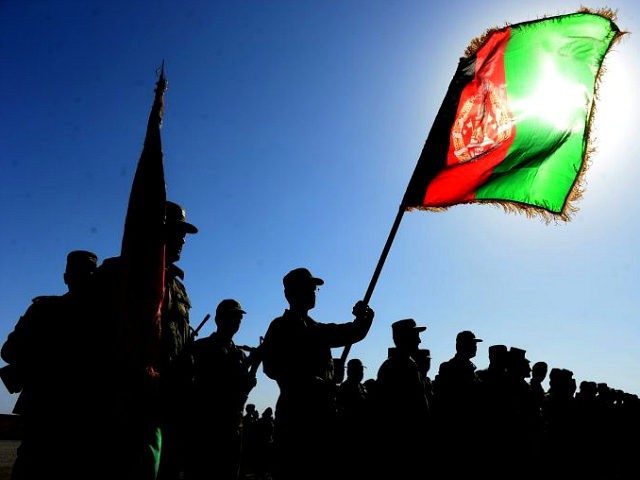Chinese state media on Wednesday anticipated greater influence for Beijing in Afghanistan after U.S. and NATO withdrawal, suggesting China’s firm hand could restore order to bloody chaos after the “failure” of America’s twenty-year intervention.
China’s state Xinhua news service blamed American withdrawal for “a succession of explosive attacks in Afghanistan,” including increased Taliban activity and Saturday’s vicious bombing of a girls’ school in Kabul.
Chinese media has been working frantically to blame the U.S. for the Kabul massacre over the past week, while simultaneously insisting American withdrawal must proceed as swiftly as possible. Xinhua hit both of these contradictory points, reconciling them by blaming U.S. policy for all violence in Afghanistan and proposing China as an alternative steward that might be able to negotiate a lasting peace:
U.S. President Joe Biden’s recent remarks that Washington has achieved its goal of smashing al-Qaeda’s network was doubted by Afghan public opinion.
The U.S.-led war on terror in Afghanistan has been described by local observers as a failure. Countless Afghans including civilians, security personnel and Taliban militants have been killed in so-called anti-terror combat, yet the brutal fighting and bloody attacks continue.
To prevent the country from being dragged into a protracted war and becoming a heaven for violence and terrorism once again, the only choice is to promote the peace and reconciliation process through dialogue and international cooperation.
Another Chinese state publication, the Global Times, portrayed China and its “Central Asian partners” as already stepping in to stabilize Afghanistan and keep it from becoming a “breeding ground” for the “Three Evils” of “terrorism, separatism, and religious extremism.”
China routinely justifies its brutal oppression of ethnic and religious minorities such as the Uyghur Muslims by accusing them of spreading the Three Evils, so its power play in Afghanistan has propaganda value as a way of comparing the situation in Afghanistan with Xinjiang, which currently is home to no known terrorist organizations.
The Global Times made much of Chinese Foreign Minister Wang Yi holding talks on Wednesday with the foreign ministers of Kazakhstan, Uzbekistan, Tajikistan, Kyrgyzstan, and Turkmenistan – a group referred to as “C+C5” in combination with China – to discuss the “chaotic situations” created by U.S. withdrawal from Afghanistan, including the possible impact on China’s Belt and Road Initiative (BRI):
Since the U.S. announced it will pull out its troops from Afghanistan by September 11, the Afghanistan issue is becoming a hot topic that has attracted attention worldwide, not only among the US’ NATO allies, but also from neighboring countries of Afghanistan, including China. Wang elaborated China’s position on Afghan situation at the C+C5 meeting.
China believes that “foreign troops should withdraw from Afghanistan in an orderly and responsible manner to prevent any hasty action from adversely affecting and seriously interfering with the peace and reconciliation process in Afghanistan,” said the Chinese foreign minister.
Wang said that it is necessary for neighboring countries of Afghanistan, including Uzbekistan and Tajikistan, to coordinate their positions in a timely manner, speak with one voice, and fully support the Afghan domestic peace process to overcome difficulties and move forward, the Xinhua News Agency reported on Wednesday.
The Global Times quoted Chinese analysts who advocated pushing American influence out of the region entirely because any lasting U.S. presence in Central Asia would also “increase U.S. political and intelligence activities in relevant countries” with the goal of strengthening opposition groups and fomenting “color revolutions” – i.e. overthrowing the regimes that China is doing business with through Belt and Road.
Chinese mouthpieces dangled the prospect of Afghanistan joining China’s Shanghai Cooperation Organization (SCO) if the Afghan government and the Taliban can “reach an agreement to form a new government peacefully.” They accused the United States of turning Afghanistan into a “breeding ground” for both the Three Evils and drug trafficking, then pulling out and leaving a “mess” for China, Russia, and the SCO to clean up.
Besides extending its economic and political influence through Belt and Road, China is eager to exploit Central Asia for its energy sources, with the Global Times specifically mentioning natural gas from Turkmenistan. The article suggested China has reached an understanding with Russia to leave Afghanistan and Central Asia in Beijing’s hands.
Afghanistan may have proved a bloody quagmire for Russia and a terrible disappointment for American nation-building enthusiasts, but strategic analysts have long understood that China actually has a use for that fabled “graveyard of empires” because of BRI and its offshoots, like the China-Pakistan Economic Corridor (CPEC).
China and Pakistan discussed bringing Afghanistan into CPEC as far back as 2017, and the Taliban appears willing to participate in BRI projects if rewarded handsomely enough. The concentration camps of Xinjiang province and the ethnic cleansing of the Uyghurs should have sent the Taliban a message about their fate under Chinese domination if they decide not to be productive business partners. Conversely, Beijing is not about to lecture anyone in Afghanistan about human rights or government corruption.

COMMENTS
Please let us know if you're having issues with commenting.